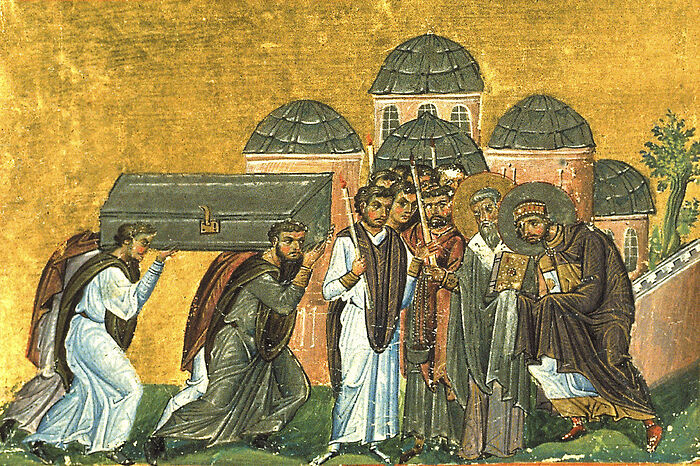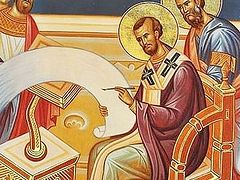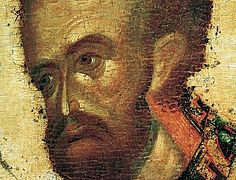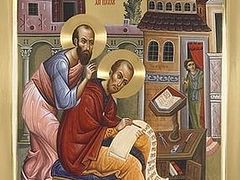“For this the Holy Scriptures drew us a great and sublime picture of the life of ancient people—from Adam to Christ; for this it describes to us both the fallen and the crowned, by the example of both to convince us of the truth that if you do not harm yourself, no one else can harm you.”
 Translation of the relics of St. John Chrysostom to the Church of the Holy Apostles in Constantinople
Translation of the relics of St. John Chrysostom to the Church of the Holy Apostles in Constantinople
In the world ye shall have tribulation (Jn. 16:33), our Lord Jesus Christ said to His disciples and in their person to all future preachers of the Gospel. The servant is not greater than his lord. If they have persecuted Me, they will also persecute you (Jn. 15:20). The truth of these words, confirmed by the experience of many preachers of the Gospel, was also confirmed in the life of the great teacher of the Church, St. John Chrysostom. Elevated to the highest archpastoral throne, with full awareness of the importance of his duty he could not look indifferently at the vices of the luxurious capital of the ancient world; and vice, for its part, could not indifferently tolerate denunciations from the preacher of repentance. Sooner or later, but inevitably, a struggle between virtue and wickedness was to break out, which in this life, by the unfathomable ways of Providence, often ends in the external triumph of the latter. St. John Chrysostom, in the light of the Gospel, was not afraid to reveal the most secret human vices and, tearing off their false and dazzling mask, he exposed them in all their shameful form. Possessing the gift of being able to influence the heart and touch people’s consciences, he awakened them with all his might from moral sleep, turning their eyes unceasingly on themselves. Hence the natural consequence: those in whom the love of goodness had not yet ebbed away and whom the archpastor guided to the path of repentance and to a quiet haven of spiritual peace loved and respected St. John Chrysostom; on the contrary, those who hated light and for whom his preaching was like a two-edged sword, persecuted him. The holy pastor saw the ever increasing number and malice of his enemies, foresaw the danger threatening him, and in spite of everything, continued his work. “I am ready to shed my blood, if only I could somehow prevent the spread of evil. I am not in the least disturbed by the hatred and malice of my enemies; the only thing that concerns my heart is the reform of my hearers,” he said. I will not go into details of how the prince of darkness armed himself against the fearless preacher of the truth; it is enough to say that malice eventually triumphed. The illegally convened Church Council, partly by St. John’s obvious enemies, partly by seduced and deceived bishops, put the holy man on trial. Obvious slander, his words and actions maliciously interpreted, the great teacher of the Church in the sixth year of his archpastoral ministry was sentenced to imprisonment.
While his friends, forty bishops, lamented, he was completely calm and even cheerful. “Pray, my brethren,” St. John Chrysostom, who was waiting from hour to hour for the arrival of an official with a decree on his expulsion. “And if you love Christ, then let each of you not leave your flock, for my sake. Now I can say with Paul, The time of my departure is at hand (2 Tim. 4:6). After many sufferings that lie ahead I will depart this life, for I clearly see the attempts against me by satan, who can no longer tolerate my preaching against his kingdom. Be sure to remember me in your prayers.” Tears of those around were the answer to his words. “Weep not, my brethren,” the holy pastor proceeded. “You are tearing my heart apart, For to me to live is Christ, and to die is gain (Phil. 1:21). Keep in mind what I have always told you: our life is a journey in which we have to go through both good and bad. It is like a market where we buy and sell in order to return home with gain.”
“But we are sorry for the Church, which is losing its teacher,” one of the bishops objected. Chrysostom answered: “I am not the first teacher of the Church, and I will not be the last. Paul was beheaded, but left behind Titus, Apollos, Timothy, and many others.” At the sight of people, who in tears and sorrow surrounded the bishop’s house and filled the church, the pastor’s loving heart was filled with compassion. He once again appeared at the church, which so often resounded with his words, and encouraging and consoling the grieving flock, he said: “The waves are strong, the storm is severe! But I am not afraid of drowning, for I am standing on a rock. Let the sea rage—it will not crush the rock! Let the waves rise—they will not swallow the ship of Jesus! Tell me what should I be afraid of? Of death? For to me to live is Christ, and to die is gain. Exile? The earth is the Lord’s, and the fulness thereof (Ps. 23:1). The confiscation of property? For we brought nothing into this world, and it is certain we can carry nothing out (1 Tim. 6:7). I despise the fear of this world and laugh at its blessings; I am not afraid of poverty and do not desire wealth; I am not afraid of death and I am not attached to life, except for your benefit... I have the Lord’s promise and do not rely on my strength—I have His Word. It is my support, my stronghold, my calm haven. Let the whole earth be in turmoil—I have the Gospel and read it; its words are a rampart and a protection for me. What words? I am with you always, even unto the end of the world (Mt. 28:20). Since Christ is with me, whom should I fear? Let the waves, let the sea, let the fury of the powers that be rise against me—all this is weaker than a cobweb! And if it weren’t for you stopping me with your love, I would leave immediately. I always pray: ‘May Thy will be done, O Lord! not as one or another wills, but as Thou willest.’ Here is my fortress, here is my immovable stone, here is my unshakable staff! Let whatever pleases God be! If it pleases Him to keep me here, I thank Him. I will thank Him wherever He chooses to put me.”
Then, addressing the people in fiery expressions filled with paternal tenderness and love, the holy pastor tried to inspire them with the courage with which he himself was inspired. Having said goodbye to his flock in this way, Chrysostom went into exile with a peaceful spirit. But this time the Lord was not pleased to accept from the holy man the sacrifice of self-denial—he was to offer another, a more perfect one. It was hard to leave his flock, whom he loved with fatherly love and about whom he himself said: “How can I forget you? You are my kin, you are my life, you are my glory, you are my fathers, you are my brethren, you are my children, you are my members, you are my body, you are my light and more than light!” But the good pastor had not yet seen the solemn expression of his flock’s zeal for him, and he had not yet seen the full triumph of the flock’s love for their pastor—and it was given to him to enjoy this triumph in order to return it again as a sacrifice.
The following night after St. John Chrysostom’s exile, a powerful earthquake in Constantinople shook the conscience of the emperor and the empress: The next day, ambassadors one after another set off after the exiled pastor to bring him back to the orphaned flock again. A myriad of people filled the shore, the Bosphorus strait covered with ships impatiently desiring to see their pastor; with burning lamps and the singing of sacred songs the grateful flock welcomed and accompanied St. John to his church; even Jews and pagans shared the triumph of the faithful with unfeigned joy. St. Chrysostom was touched to the bottom of his heart by this sight. Since he had been deposed, he did not want to enter the church, but the love of the flock prevailed. “Stand on your bishop’s pulpit, teach us peace, tell us a word!” people shouted to him from all sides, and the pastor’s love obeyed. “Blessed be God!” Chrysostom said, entering the church. “Thus I spoke when I was leaving you; so I say now; and I did not stop saying so there... I thanked God when I was exiled; I bless Him now on my return... Blessed be God Who removed me; blessed be God Who returned me! Blessed be God Who allowed the storm to come to me, and blessed be God Who drove it away! See what the deceit of the enemies has done: it strengthened the kind disposition, kindled zeal, and added thousands who love me. Until now only my own flock loved me, but now Jews respect me as well. They hoped to separate me from my people, but they made strangers join me. What a peace their cunning produced! What glory they prepared!”
But St. John Chrysostom was destined to sacrifice this glory, the only consolation on earth for preachers of the truth, to the Lord, and the Lord did not hesitate to demand this sacrifice from him. A few months later, the great teacher of the Church was sent to exile again, which lasted till the end of his life.
In the final years of Chrysostom’s life full of temptations, amid hard and agonizing sufferings, all the greatness of his holy soul was revealed. He was exiled to a remote place in Armenia called Cucusus. Along the way he had to endure many insults from his adversaries who did not stop pursuing him in exile. With poor health, he was relocated to a harsh climate and lived there in constant danger of attacks from ferocious barbarians—the Isaurians. In mid-winter, surrounded on all sides by barbarians, he had to seek refuge in a small fortress. But the truths of faith always inspired him and gave him such strength and power that even in this distressed state, without sparing himself, he did everything only for the spiritual benefit of others: he tried to spread the Word of God among the barbarians and did not stop comforting his grieving friends in Constantinople on whom all the malice of his enemies had been poured out after his deposition. His golden words, which he wrote to comfort his friends, will show us what uplifted and strengthened his soul in the midst of all his sufferings.
In one of his letters to Deaconess Olympias of Constantinople he writes: “Even when I look at these calamities I do not abandon the hope of better things, considering as I do Who the Pilot is in all this—not one Who gets the better of the storm by His art, but calms the raging waters by His rod. But if He does not effect this at the outset and speedily, such is His custom—He does not at the beginning put down these terrible evils, but when they have increased, and come to extremities, and most persons are reduced to despair, then He works wondrously, and beyond all expectation, thus manifesting His own power, and training the patience of those who undergo these calamities. Do not therefore be cast down. For there is only one thing, which is really terrible, only one real trial, and that is sin. But as for all other things, plots, enmities, frauds, calumnies, insults, accusations, confiscation, exile, warfare of the whole world, or anything else you like to name, they are but idle tales!1“
Having then listed many examples of Divine acts from the Holy Scriptures, which served for him as the only guide in considering all incidents, the source of hope and consolation, he continues: “Do you see the abundance of resource belonging to God? His wisdom, His extraordinary power, His loving-kindness and care? Be not therefore dismayed or troubled but continue to give thanks to God for all things, praising, and invoking Him; beseeching and supplicating. For our Master is not baffled by the difficulty, even if all things are reduced to the extremity of ruin. For it is possible for Him to raise those who have fallen, to convert those who are in error, to release those who have been laden with countless sins and make them righteous, to quicken those who are dead... If then even now you will reckon up the good things with the painful, you will see that many events have occurred which if not positive signs and wonders do yet resemble signs, and are unspeakable proofs of the great Providence and succor of God.”2
To comfort and strengthen his suffering and persecuted friends, St. John Chrysostom wrote a special work in which he set forth the great thought he loved: “If you do not harm yourself, no one else can harm you.” He writes: “For this the Holy Scriptures drew us a great and sublime picture of the life of ancient people—from Adam to Christ; for this it describes to us both the fallen and the crowned, by the example of both to convince us of the truth that if you do not harm yourself, no one else can harm you. For no extreme circumstances, no change of time, no disasters—be there a thousand of them—nothing can shake the courageous, sober and vigilant; on the contrary, a thousand saving means will not help him who is careless, has succumbed to evil and does not help himself. Pointing to the example of the Three Holy Youths in the fiery furnace and the Prophet Daniel, he continues: “But will you say that God was with them and saved them from the flames? That is true. But if you do everything in your power, then surely God will do everything for you. And I do not marvel at them and praise them because they trampled down flames and conquered the power of fire, but because they were ready to suffer for the truth both in bonds and in fire. Their victory began even when they, with courage and freedom, were brought before the king, saying: We are not careful to answer thee in this matter. If it be so, our God Whom we serve is able to deliver us from the burning fiery furnace, and He will deliver us out of thine hand, O king. But if not, be it known unto thee, O king, that we will not serve thy gods, nor worship the golden image which thou hast set up (Dan. 3:16-18). That the flame was ashamed of their bodies, broke their bonds, forgot its own action, and the fiery furnace became a source of cool water—this was a miracle of the grace of God. But the heroes set up a trophy, won the victory, adorned themselves with a crown, and were proclaimed conquerors in Heaven and on earth once they entered the flames.”
For the same purpose St. John Chrysostom wrote another, lengthy work for those who, looking at the undeserved sufferings of the pious and the external triumph of the vicious, were tempted even to the point of grumbling and despair. St. John Chrysostom calls such faint-hearted people sick and offers his work to them instead of a remedy. As an experienced spiritual doctor, he first seeks out the cause of this illness and first tries to eradicate it. “What is the cause of such illness?” he wonders. “This is a vain inquisitiveness, a childish desire to know the reasons for everything that happens, a shameless effort to comprehend the incomprehensible and ineffable paths of the infinite and inscrutable Providence of God. Isn’t it reckless, isn’t it extreme madness when a doctor cuts us, burns and gives bitter medicine and we don’t test it, patiently obeying him, even thanking him, although the consequences of all this are unknown to us and such operations often result in patients’ deaths; but, on the contrary, we try to comprehend the infinite, ineffable, inexhaustible and incomprehensible wisdom of God, to unravel why and for what this or that happens one way or another, knowing for sure that this wisdom does not err, that God’s goodness is infinite, His Providence is inexpressible, and everything He sends down leads to a good and useful goal only if we ourselves do not get in the way of the fact that God does not want anyone’s eternal death, but wants everyone to be saved? Is it not extreme madness that we want to judge the One Who alone wants and can save us, to judge at the very beginning without even waiting for the end of the incident? I do not mean the end in the present life, although it is often revealed here too, but in the life to come, for both of these lives have the same object—our salvation and glorification. They are separated by time, but connected by purpose. Thus, winter and spring follow one another, but both have the same goal—the ripening of fruits. The same happens with us. So, when you see the Church that is scattered and extremely oppressed, its best members being persecuted and killed and the primates exiled, do not look at this alone, but also at what will follow—retributions, rewards, honors and crowns; for he that endureth to the end shall be saved (Mt. 10:22). Why, you ask, has God allowed and allows so many perils, so many temptations and such slanders? Here is the reason for this: our earthly life is like a school for athletes, where there is a place of battle and struggle and there is a furnace for purification. Artists cast gold into furnaces and expose it to fire to make it purer and more precious. Teachers of athletics exercise their students in many hard tasks, fighting them like the cruelest enemies in order to make them strong, skilled and capable of repelling enemy attacks through such exercises. This is how God treats us in this life. Desiring to make a soul capable of virtue, He strikes it, tests it, and subjects it to temptations, so that through this the weak and prone to fall might be strengthened and the firm made even stronger and more impregnable to the wiles and attacks of the devil, so that everyone would eventually be able to receive future blessings, for tribulation worketh patience; And patience, experience (Rom. 5:3), St. Paul says.”
The virtuous life thanks to which St. John won respect even in exile again aroused his adversaries’ hatred. They petitioned the empress for a decree by which the exiled Chrysostom was sent to a new exile—to the Pitiunt Fortress near Colchis, on the coast of the Black Sea. The officials received a special order to treat their prisoner more strictly and to bring him to his destination in a certain number of days despite the difficult roads. The famous pastor of Constantinople had to walk for three months, now in the unbearable heat of the sun, now in pouring rain, without rest or change of clothes. Such a journey completely exhausted St. John Chrysostom’s already weak health. Feeling approaching death on the way, he begged his escorts to stop, changed his wet and soiled clothes to white, communed the Holy Mysteries and departed from this world, which was unworthy of him, with the words: “Glory to God for all things!” With the words he loved and often repeated in his life and spoke about during his sufferings: “These words are a deadly blow for satan, but for the one who utters them in every trouble and misfortune they serve as an abundant source of hope and consolation. Once you pronounce them, every cloud of sorrow dissipates.”
Throw a man who bears in himself the riches of the Heavenly world—the Kingdom of God—into the remotest corner of the earth and surround him with all possible disasters—and nothing will shake the inner peace of his spirit, for the Divine light, life, and power are always and everywhere inseparable from him. “When we die,” these Heavenly people say of themselves, “our lives are hidden with Christ in God, and nothing in the world will disturb the rest of the dead.” Such, my brethren, were the last days of life, and such was the blessed death of the Holy Hierarch John, who is commemorated today. Remember them which have the rule over you, who have spoken unto you the word of God: whose faith follow, considering the end of their conversation (Heb. 13:7).
Amen.



